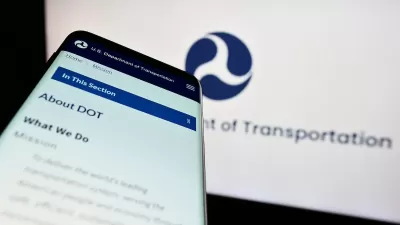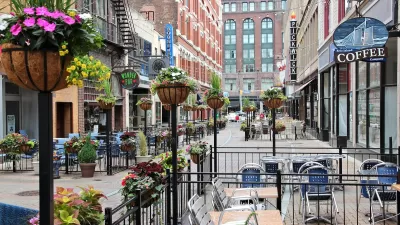Micheline Maynard writes about an AASHTO study showing that the share of American families who don't own cars had been declining since 1960 but stopped in 2007 at 8.7%. By 2011, it had budged up to 9.3%. She suggests four reasons for the reversal.
This essay is one of many that Maynard, a Forbes contributor, has written for her journalism project, Curbing Cars. Access to autos is just one of the findings found in "Commuting in America 2013: The National Report on Commuting Trends and Patterns", a 24-page study (PDF) written by the American Association of State Highway and Transportation Officials (AASHTO).
Maynard explains from the onset that the data is based on 2011 figures, and that "car free families are a distinct minority. The study shows that 34.1 percent of the nation’s households own one car, 37.5 percent own two vehicles, and 19.1 percent are three-or-more-vehicle households." I would add that a .6% budge may not be that notable - except that the number is on the rise, and that the 2007 turnaround is around the same time frame that marks "peak-driving", discussed here numerous times, particularly by millennials.
Notwithstanding "the high cost of owning and maintaining a car", Maynard suggests four distinct reasons for the increase in car-free families, with the relationship to population density being one of the most interesting. Links to below bullet points connect to five of the seven gallery frames.
- "A fascinating part of the study discusses the fact that as population density increases, cars become less available — a logical outcome of living in urban areas. About 30 percent of people who live in areas with 10,000 residents or more per square mile say they do not have access to cars. Likewise, pretty much everyone who lives in an area with fewer than 2,000 residents per square mile can get hold of a vehicle."
- "Lack of a driver’s license"
- "Access to other transportation" including bicycling
- Walkable communities making living car-free easier
While Maynard does not include the technology boom, particularly among millennials as one of the key reasons for reduced car ownership, the study does account for it, according to Maynard.
“Changes in alternatives to travel, such as communication substituting for travel and renewed interest in and availability of options such as transit, bike and walk, helped dampen interest in expanding auto ownership,” they wrote.
The AASHTO report and the reasons that Maynard attributes for the increasing share of families choosing to live car-free are important in that the findings are consistent with other studies showing a decline in per capita driving around (or before) 2007, as well as the nexus of car ownership to walkable communities and population density. We look forward to forthcoming studies to confirm whether the tide is indeed changing.
FULL STORY: 4 Big Reasons Why People Are Giving Up Cars

Maui's Vacation Rental Debate Turns Ugly
Verbal attacks, misinformation campaigns and fistfights plague a high-stakes debate to convert thousands of vacation rentals into long-term housing.

Planetizen Federal Action Tracker
A weekly monitor of how Trump’s orders and actions are impacting planners and planning in America.

Chicago’s Ghost Rails
Just beneath the surface of the modern city lie the remnants of its expansive early 20th-century streetcar system.

Bend, Oregon Zoning Reforms Prioritize Small-Scale Housing
The city altered its zoning code to allow multi-family housing and eliminated parking mandates citywide.

Amtrak Cutting Jobs, Funding to High-Speed Rail
The agency plans to cut 10 percent of its workforce and has confirmed it will not fund new high-speed rail projects.

LA Denies Basic Services to Unhoused Residents
The city has repeatedly failed to respond to requests for trash pickup at encampment sites, and eliminated a program that provided mobile showers and toilets.
Urban Design for Planners 1: Software Tools
This six-course series explores essential urban design concepts using open source software and equips planners with the tools they need to participate fully in the urban design process.
Planning for Universal Design
Learn the tools for implementing Universal Design in planning regulations.
planning NEXT
Appalachian Highlands Housing Partners
Mpact (founded as Rail~Volution)
City of Camden Redevelopment Agency
City of Astoria
City of Portland
City of Laramie





























